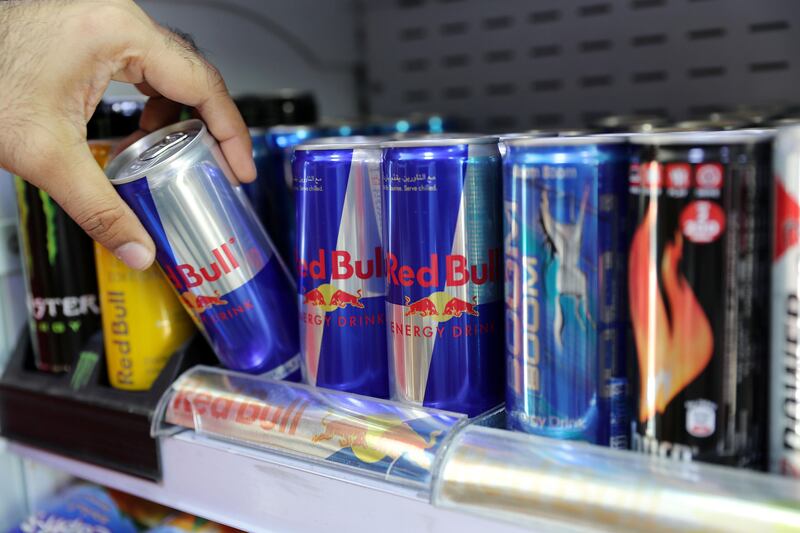More than four out of five Emirati college students consume energy drinks, and about one in five do so every day, a study has found.
The study of 522 Emiratis at four college campuses found that 85.1 per cent of students consume energy drinks.
The research found that these students reported side-effects including headaches, blurred vision, nervousness, excessive thirst and difficulty sleeping.
Doctors are now pushing for the Government to further increase taxes on the sugary drinks.
“There is no control,” said Deepti Chaturvedi, a paediatrician at Burjeel Hospital. “Sugar is addictive and gives them a kick. When it stops giving them a kick, they just keep increasing the dose.
“I think it’s the media influence, peer pressure, easy money and ease of availability that is behind the high consumption of energy drinks. They can just buy it at Baqalas. It should be banned from school or college cafeterias, make it less easily available.”
On October 1, the Government doubled the prices of sugary drinks, including energy drinks containing caffeine.
“The taxes on energy drinks levied by the Government should motivate the parents and the students to decrease consumption and to look at the effects that children are exposed to,” Dr Chaturvedi said. “They need to increase prices even further.”
Dr Matthew Robby and Sarah Sanad, at the Sharjah Women’s College health sciences department, conducted the study, Survey of Energy Drink Consumption and Adverse Health Effects: A Sample of University Students in the United Arab Emirates, which also found that most students bought the drinks because they liked the taste (39.9 per cent), while 27.7 per cent said they gave them energy.
Another 13.1 per cent said that it helped them to study, while 11.9 per cent indicated that it made them feel better and 7.5 per cent said it helped them exercise, work or drive.
Those who drank at least one energy drink a day were found to have “slight to moderately” lower grades.
Dr Chaturvedi said that introducing sugary drinks at too early an age led to high consumption of energy drinks among young people. She had seen toddlers with soft drinks, which normalises these drinks when they are very young.
She said that side-effects of energy drinks include palpitations, insomnia, chest pain, dizziness, stress and headaches.
__________________________
Read more:
[ Good for all-night study sessions but not good for sleep, student says ]
[ Drop in US fizzy drink sales early signs of healthier choices ]
[ President Sheikh Khalifa issues UAE excise tax law ]
__________________________
Long-term side-effects have not been understood completely but people can also suffer fatigue as the body’s adrenal system is overtaxed. Caffeine also interferes with insulin sensitivity and the body can, over time, become insulin resistant.
“It’s a very popular trend among young Emirati people,” said Dr Andrew Jamieson, an endocrinologist at Valiant Clinic in Dubai. “It’s extremely common and the effects on health are quite substantial.
“These drinks are acidic and high on sugar, so they also have an impact on dental health. Youngsters in the UAE don’t recognise the problems they’re leading themselves into by having large amounts of energy drinks.”
The doctor believes calling them energy drinks is “misleading, as they might provide calories but they don’t necessarily provide the energy people are looking for”.
Dr Jamieson agreed that prices should be increased again.
“You have to find the price point at which it becomes prohibitive,” he said. “You have to make the drink so expensive that they would rather buy something like water for a tenth of the price.”
Roisin Thomas, a professional cyclist and personal trainer in Abu Dhabi, said it was different for athletes.
“When training I burn about 1,300 calories a day and having a sugary drink may be OK for me on that day,” Thomas said. “If you are a regular person, then you don’t need that can of sugary drink.
“Energy drinks may help me because it’s a surge of caffeine but most people don’t need it. If you do feel you need it, you should check with the doctor.
“Most athletes rely on maybe a coffee or a drink that has some glucose before a ride, but they don’t rely on energy drinks.”
Dr Arun Thangaraj, a gastroenterologist at Aster Clinic in Karama, Dubai, tried some energy drinks and found that there was a temporary boost but then they could backfire.
“It’s like anything that acts on your brain – you get pleasure and slowly it becomes an addiction,” Dr Thangaraj said.
“Any chemicals in the long run will have a detrimental impact on your body. The phosphoric acid in carbonated drinks increases acidity and acid reflux.”






